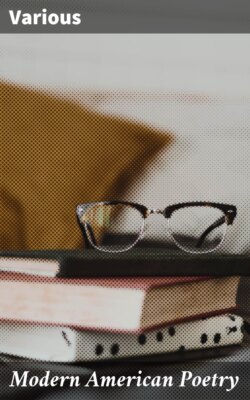Читать книгу Modern American Poetry - Various - Страница 12
На сайте Литреса книга снята с продажи.
LINDSAY, OPPENHEIM AND OTHERS
ОглавлениеTable of Contents
Lindsay is essentially a people’s poet. He does not hesitate to express himself in terms of the lowest common denominator; his fingers are alternately on his pen and the public pulse. Living near enough the South to appreciate the negro and yet not too near to despise him, Lindsay has been tremendously influenced by the colorful suggestions, the fantastic superstitions, the revivalistic gusto, the half-savage Christianity and, above all, by the curiously syncopated music that characterize the black man in America. In “The Congo,” “John Brown” and the less extended but equally remarkable “Simon Legree,” the words roll with the solemnity of an exhortation, dance with a grotesque fervor or snap, crackle, wink and leap with all the humorous rhythms of a piece of “ragtime.” Lindsay catches the burly color and boisterous music of camp-meetings, minstrel shows, revival jubilees.
And Lindsay does more. He carries his democratic determinations further than any of his confrères. His dream is of a great communal Art; he preaches the gospel that all villages should be centers of beauty, all its citizens, artists. At heart a missionary even more than a minstrel, Lindsay often loses himself in his own evangelism; worse, he frequently cheapens himself and caricatures his own gift by pandering to the vaudeville instinct that insists on putting a noisy “punch” into everything, regardless of taste, artistry or a sense of proportion. He is most impressive when he is least frenetic, when he is purely fantastic (as in “The Chinese Nightingale” or the series of metaphorical poems about the moon) or when a greater theme and a finer restraint unite (as in “The Eagle That Is Forgotten”) to create a preaching that does not cease to be poetry.
Something of the same blend of prophet and poet is found in the work of James Oppenheim. Oppenheim is a throwback to the ancient Hebrew singers; the music of the Psalms rolls through his lines, the fire of Isaiah kindles his spirit. This poetry, with its obvious reminders of Whitman, is biblical in its inflection, Oriental in its heat; it runs through forgotten centuries and brings buried Asia to busy America. It carries to the Western world the color of the East, adding the gift of prophecy to pragmatic purpose. In books like War and Laughter and Songs for the New Age the race of god-breakers and god-makers speaks with a new voice; here, with analytic intensity, the old iconoclasm and still older worship are again united.
The new poets have won their way by their differences as well as by their chance similarities. They belong to no one school, represent no single tendency and, differing widely from their present-day English fellow-craftsmen, are far less hampered by the burdens of traditions or the necessity of casting them off. They are more nearly free. One sees this even in the work of the more deliberately conventional singers. Lyricists like Sara Teasdale and Edna St. Vincent Millay write in a clean, straightforward idiom, an intense naturalness that is a frank commentary on the tinkling and over-sentimental verse that used to pass for genuine emotion. Robert Frost and E. A. Robinson continue to use the strictest rhymes and most rigid meters and yet their lines are as “modern,” as searching as the freest free verse. Form per se matters scarcely at all; all forms are employed. Conrad Aiken achieves a flexible combination of rhyme and assonance. Sandburg, “H. D.,” Kreymborg and John Gould Fletcher dispense, for the most part, with rhyme, without sacrificing the beauty of sound or stress. Masters and Amy Lowell use the old forms and the new ones with impartiality and equal skill. A sweeping inclusiveness distinguishes our contemporary verse; it embraces all themes, all cultures, all modes of expression. America has become a melting-pot in a poetic as well as an ethnic sense. The rich variety of its structure and subject-matter is in striking opposition to the thin, specialized product of the transition poets. New England is no longer the single literary center. As the country has matured, the poets have grown with it, singing everywhere and, much to Art’s confusion, in every key. It is as if submerged springs had burst through stubborn ground; instead of one placid stream, there are a dozen rushing currents.
